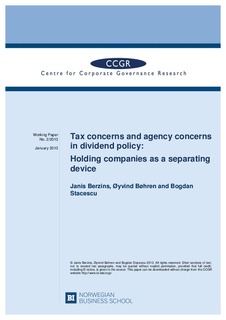| dc.contributor.author | Berzins, Janis | |
| dc.contributor.author | Bøhren, Øyvind | |
| dc.contributor.author | Stacescu, Bogdan | |
| dc.date.accessioned | 2014-06-24T13:20:24Z | |
| dc.date.available | 2014-06-24T13:20:24Z | |
| dc.date.issued | 2013 | |
| dc.identifier.uri | http://hdl.handle.net/11250/196710 | |
| dc.description.abstract | Higher dividends may create value by reducing agency costs, but may also destroy value by
increasing tax payments. This paper shows empirically how stockholders use holding
companies to establish indirect ownership through operating companies in order to obtain the
benefit of lower agency costs while also avoiding the cost of higher taxes. We identify this
relationship by studying the effect of a regulatory shift in Norway from zero to positive
dividend taxes for individuals, whereas intercorporate dividends remained tax-exempt. We
find that the use of holding companies increases strongly after the tax reform, and that
operating companies with a higher potential for agency conflicts are more often owned by
holding companies. Dividends paid from operating companies to holding companies are
higher when the operating company would face more severe agency conflicts if such
payments were not made. The payout is also higher and more stable from operating
companies than from holding companies. These findings are consistent with the notion that
stockholders choose organizational forms that separate tax effects from agency effects in
dividend policy. | nb_NO |
| dc.language.iso | eng | nb_NO |
| dc.publisher | CCGR, BI Norwegian Business School | nb_NO |
| dc.relation.ispartofseries | CCGR Working Paper;2/2013 | |
| dc.title | Tax concerns and agency concerns in dividend policy: Holding companies as a separating device | nb_NO |
| dc.type | Working paper | nb_NO |
| dc.source.pagenumber | 29 pages | nb_NO |
